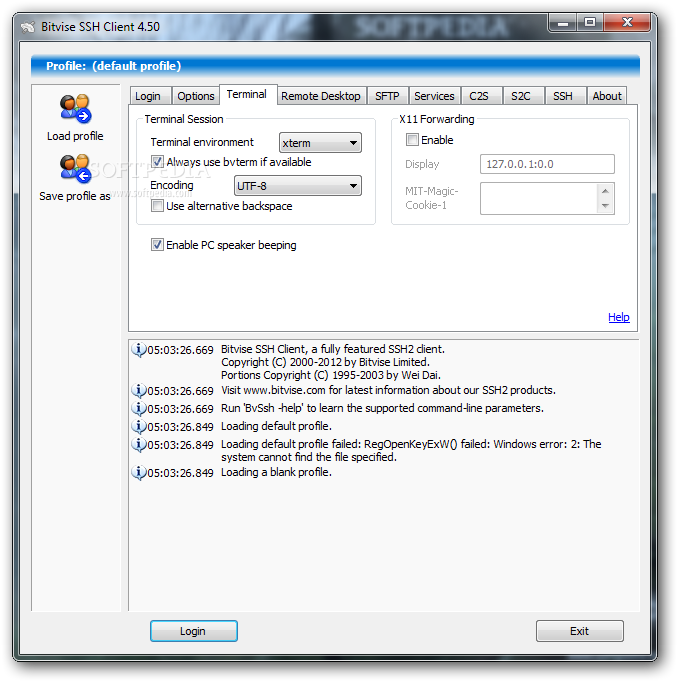Ssh Client For Mac .pem Without Terminal
Dameware SSH client is a free Windows SSH terminal emulator that allows multiple telnet and SSH connects from one easy-to-use console. Dameware SSH Client for Windows Dameware SSH client’s features include. If you chose to configure key-based authentication, you must have the SSH private key for the bitnami user account in.ppk format (for Windows) or in.pem format (for Linux and Mac OS X). Connect with an SSH client on Windows using an SSH key.
Mac users have an alternative to Apple®'s built-in Terminal application. VanDyke Software's terminal emulation client, SecureCRT®, supports Mac, giving you the security of Secure Shell and the advanced functionality of our feature-rich terminal emulator.
Robust Terminal Emulation Client
SecureCRT supports a wide range of terminal emulations, including:

- VT100, VT102, VT220
- Wyse 50/60
- Xterm
- ANSI
- SCO ANSI
In addition to connecting using Secure Shell (SSH1 and SSH2), SecureCRT also supports serial protocol.
Connections are easy to manage using SecureCRT's tabbed or tiled display, and a number of session customization options help you monitor session activity (or inactivity) at a glance.
Bitvise Ssh Client For Mac
Multi-Platform Versatility
SecureCRT is available for most major platforms, including Windows® and Linux. Multi-platform support allows you to switch between systems without having to manually reenter session data. You can easily copy sessions to and from Windows/Mac/Linux machines.
The ease with which you can switch between systems makes SecureCRT an ideal terminal emulation client for IT professionals who work from a number of locations on various systems.
Get Started
SecureCRT is an SSH client that gives Mac users robust terminal emulation capabilities and loads of time-saving features. Multi-platform support makes SecureCRT an ideal SSH client to deploy organization-wide.
Download SecureCRT for a free 30-day evaluation.
Please contact us for assistance in finding the right solution for your organization.
VanDyke Software — Strong Security, Easy Access, Anywhere, Any Time
I have been using Putty on Windows XP and used the .ppk file to connect to my Linux servers (several servers).
On the servers I have the following folder and file ~/.ssh/authorized_keys
I now want to use a Mac to connect via the terminal. I have set up the remote connections to the servers manually and want to know how I can setup using the ppk file or the private/public key within it.
Please note : I already am using private/public key login from Windows so I do not need to create a new key using keygen, I just want to know how to set up now that I have the keys already. (In other words, I already have the authorized key lists on the server, and the public and private key).
Nicoleclosed as off-topic by Pang, Kenster, Stefan BeckerAug 14 at 5:08
This question appears to be off-topic. The users who voted to close gave this specific reason:
- 'Questions about general computing hardware and software are off-topic for Stack Overflow unless they directly involve tools used primarily for programming. You may be able to get help on Super User.' – Pang, Kenster, Stefan Becker
Ssh Terminal Mac
3 Answers
You can ssh directly from the Terminal on Mac, but you need to use a .PEM key rather than the putty.PPK key. You can use PuttyGen on Windows to convert from .PEM to .PPK, I'm not sure about the other way around though.
You can also convert the key using putty for Mac via port or brew:
or
This will also install puttygen. To get puttygen to output a .PEM file:
Once you have the key, open a terminal window and:
The private key must have tight security settings otherwise SSH complains. Make sure only the user can read the key.
Piran
Convert PPK to OpenSSh
OS X: Install Homebrew, then run
brew install putty
Place your keys in some directory, e.g. your home folder. Now convert the PPK keys to SSH keypairs:cache search
To generate the private key:
cd ~
puttygen id_dsa.ppk -O private-openssh -o id_dsa
and to generate the public key:
puttygen id_dsa.ppk -O public-openssh -o id_dsa.pub
Move these keys to ~/.ssh and make sure the permissions are set to private for your private key:
connect with ssh server
Port Forwarding to connect mysql remote server
PiranThere is a way to do this without installing putty on your Mac. You can easily convert your existing PPK file to a PEM file using PuTTYgen on Windows.
Launch PuTTYgen and then load the existing private key file using the Load button. From the 'Conversions' menu select 'Export OpenSSH key' and save the private key file with the .pem file extension.
Copy the PEM file to your Mac and set it to be read-only by your user:
Then you should be able to use ssh to connect to your remote server